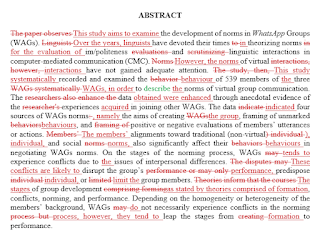Novia Fajar Masyitoh1, Noor Malihah1, Faizal Risdianto1 and Agung Guritno1
Published under licence by IOP Publishing Ltd
Journal of Physics: Conference Series, Volume 1339, International Conference Computer Science and Engineering (IC2SE) 26–27 April 2019, Padang, IndonesiaCitation Novia Fajar Masyitoh et al 2019 J. Phys.: Conf. Ser. 1339 012118
1168 Total downloads
Abstract
The aim of this research is to develop an educational multimedia in the form of video as one of media to teach speaking. Research and development design is used to produce an educational multimedia entitled Nginggris Narsis. Procedures of this research includes identification students and teachers need, planning and product design, product small scale tryout, validation of the expert, product revision, product large scale try out and revision, and dissemination. This video is used to teach the first grade students of Junior High School in Indonesia of which curriculum implemented is 2013 curriculum. The results show that NginggrisNarsis is an appropriate material to teach EFL learners in speaking, although there are still some weaknesses found within this video. Nginggris Narsis as educational media to teach speaking help both teachers and students in introducing English as a foreign language for Indonesian students.
Research Article
Faizal Risdianto1,*, Sari Famularsih1, Setia Rini1, Ahmad Mifdlol Muthohar1
1: IAIN Salatiga, Indonesia *Contact email: faizalrisdianto@iainsalatiga.ac.id
Abstract
For several years there has been an appreciation and huge awareness pertaining to the importance autonomy of learners and the role of individual and group learners in leading their process of learning inside and outside the classroom. Nevertheless, in real teaching and learning process, it is not always visible how to encourage and develop learners dealing with this role, and how to ensure they are ready to perform it. The topic of autonomy of learners is widely discussed and acknowledged among social scientists and observers but perhaps to its complex and myriad characteristics, the autonomy of learners has not been studied widely up to present day. To fill this gap, this qualitative research was conducted to investigate the use of drama to build autonomous English learning towards the students of International class program of IAIN Salatiga batch 2018. They are able to develop their potential in maximum way and be able to learn together in their peer learning group. The second, from the given questionnaire’s answers, dealing with the strength of the use of drama in improving student’s autonomous learning, it can be seen that there are 16 students who felt that drama performance can improve students’ speaking ability, mastery of vocabulary and boost their self-confidence. Pertaining to the weakness of the use of drama in building autonomous learning there are 17 students who said that there is no weakness in the use of drama to build autonomous learning. Keywords: drama autonomous learning english speaking skills
Arti Novia Tiara Kristy, Noor Malihah, Faizal Risdianto, Supardi Supardi
Abstract
This research aims to analyze the problems and challenges encountered by Digital Natives and to find out how they overcome them in English learning. The Digital Natives were students of the English Department, IAIN Salatiga, in Academic Year 2017/2018. The methodology of this research was descriptive qualitative. This research used questionnaires and interviews. The questionnaire was used to find out the problem, challenge, and solution of Digital Natives in learning English. The interview section was to collect the information from participants about their experience, the problems and challenges, and how to solve them. This research, it was conducted data analysis by data reduction by simplifying, classifying, and removing unnecessary or irrelevant data to achieve the best finding of the research. The results showed that bad internet signal and connection, the negative effect of the technology and language learning problem. The challenge they frequently have is coping with the problem of lack of English vocabulary and they are being unsociable to the environment. The research showed that technology can be used as an effective digital tool to learn English. It can be seen by the participants’ learning experience. The digital tool assists English learner by overcoming their problems and challenges, what are the participants get more in using the digital tool is how fun the digital tool make easier for English learners... To overcome those problems, they should be wise with their dependence on the gadget and the internet. Then after a long time getting difficult vocabulary, they looked up some online dictionaries and asked to their friends.
Keywords: Digital Natives, Problem and Challenge, English Learner.
Norwanto Norwanto, Faizal Risdianto
Abstract
This linguistics study aims to observe the development of norms in WhatsApp Groups (WAGs). Over the years, linguists have devoted their time to theorizing norms of im/politeness evaluations and linguistic interactions in computer-mediated communication (CMC). However, the norms of virtual interactions have not gained adequate attention. This study systematically documented and examined the conversations of 539 members of three WAGs to describe the norms of virtual group communication. The data obtained were enhanced through anecdotal evidence of the experiences acquired in joining other WAGs. The data indicated four sources of WAGs norms: the aims of creating the group, framing unmarked behaviors, and framing positive or negative evaluations of members' utterances or actions. The members' alignments toward non-virtual individual and social norms also significantly affect their negotiating WAG norms. In the stages of the norming process, WAGs tend to experience conflicts due to interpersonal differences. These disputes are likely to disrupt the group's performance or predispose some members. Theoretically, group development is comprised of formation, conflicts, norming, and performance. Depending on the homogeneity or heterogeneity of the member's background, WAGs do not necessarily experience conflicts in the norming process. However, some of them tend to leap the stages from formation to performance.
Keywords: im/politeness evaluations; norms; virtual communication; WhatsApp Group conversations


No comments:
Post a Comment
Thanks for your comment...I am looking forward your next visit..